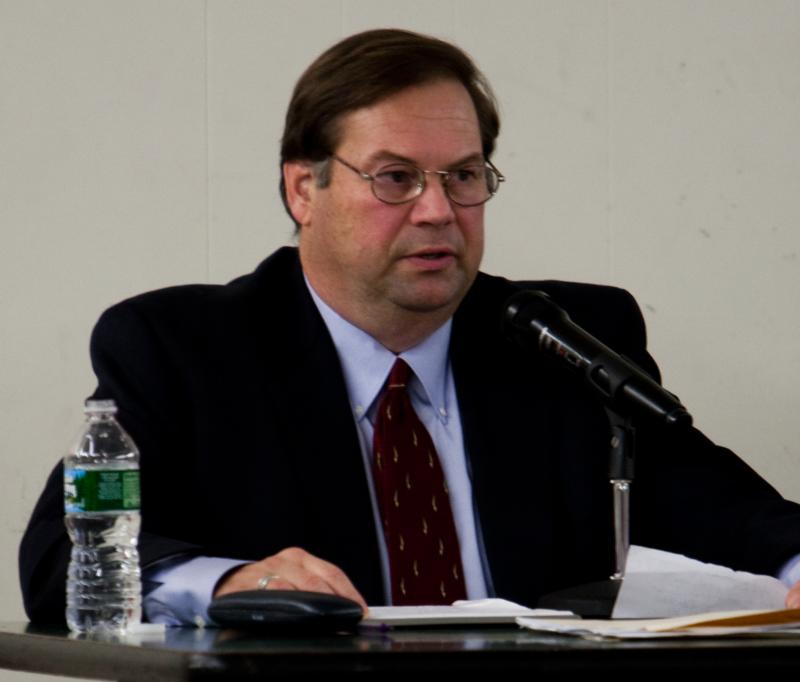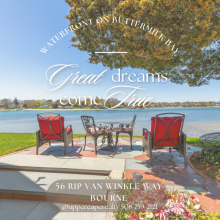Board of Selectmen Candidate: Bruce Sauvageau
Candidate Bruce Sauvageau says that experience is what the Board of Selectmen needs in order to be more effective.
"Right now, we have entirely new selectmen," said Sauvageau. "the lack of real history and knowledge is actually holding the Board back and preventing them from getting the issues done expeditiously."
Sauvageau spent 7 years on the Board of Selectmen -- from 2003-2010 -- and was chair of the board in 2006 and in 2009. He was defeated in his re-election bid, coming second to last in the five-way race in 2010.
In addition to the Selectmen. Sauvageau has served on the Finance Committee for 3 years, on the Affordable Housing Partnership for 4 years, and worked with the Middle School Building Committee, which completed the building of the middle school "on time and on budget, [with] 88% reimbursement from the state," Sauvageau said.
Sauvageau also spent 8 years on the Zoning Rewrite Committee which was in charge of rewriting and modernizing Wareham's zoning by-laws, in addition to participating in many other organizations.
His years of experience serving as a Selectman and on the various committees, according to Sauvageau, give him the "institutional knowledge" necessary to come up with realistic solutions to Wareham's problems.
Sauvageau was criticized while serving on the Board of Selectmen for owing more than $181,000 dollars in unpaid federal and state income taxes. Asked about that issue, Sauvageau said it is "substantially resolved," adding: "Quite frankly, it's a personal matter. I can't see it's an issue for any other purpose than politics."
The town's problem, as Sauvageau sees it, is money -- or lack thereof. A large part of the budget is due to structural costs to the town -- or expenses and debt that the town is legally required to pay, such as healthcare, education costs and retirement benefits.
Those costs are "increasing faster than our ability to produce a tax levy to pay for it," said Sauvageau.
Since municipalities raise their money from property taxes, towns naturally see increased revenue when with increased growth, both in residential houses and commercial businesses, Sauvageau said. Towns also raise money by taxing the inventory on the shelves of commercial enterprises, he said.
The solution to Wareham's problem, therefore, is new growth to help the town raise the necessary money to pay the costs and balance the budget, Sauvageau said.
Sauvageau believes that the growth can't happen on the residential side, since Wareham "couldn't build enough houses to get ourselves out of our problem."
That leaves commercial growth and development.
Sauvageau proposes many different plans for increasing development in Wareham.
First, he believes that the town finish the Westfield project.
First, he believes that the town should finish the Westfield project, which when completed will provide affordable senior housing on the 77-acre Westfield property in West Wareham. The project was overwhelming approved by Town Meeting in October 2010 after twice being sent for further study at previous Town Meetings.
The town is looking for a developer to pay for the project, so it costs nothing to the town, while the town would get an enormous benefit from property taxes and sewer and water fees, Sauvageau said.
The affordable housing that it would provide for Wareham's seniors would also keep them shopping in Wareham. Seniors have discretionary income that they spend in town, giving an added benefit to the community, according to Sauvageau.
The second development project that Sauvageau supports is bringing the commuter rail, which currently ends in Lakeville, to Wareham.
The tracks are already laid, Sauvageau said, and the funding would come from the state and federal level.
The Board of Selectmen had been working on this issue in previous years, but it has never come to fruition.
This is because the Selectmen changed once election came around, Sauvageau said.
Sauvageau argues that this is because the Board of Selectmen changes every election cycle, creating a lack of continuity. "Why did it end?" he asked. "Because this Board of Selectmen has no understanding and no knowledge of it … [not because] the current Board didn't care … they didn't even know about it."
Sauvageau also believes that the commuter rail would attract new residents who have "Boston" salaries. These residents will want expensive or "high-end" housing, according to Sauvageau, further raising the residential tax base of the town.
Sauvageau said that while he was on the Board of Selectmen in the past he learned that the A.D. Makepeace Company, the creator of the Rosebrook development on Cranberry Highway, envisions building high-end housing.
Stations will also be necessary for the commuter rail, and Sauvageau proposes creating one station at the old Tremont Nail factory on Elm Street in Wareham.
Sauvageau noted that commuter rail passengers need services such as banking, restaurants, and coffee, and a station near Main Street would help revitalize the Wareham Village and Main Street areas.
Sauvageau mentioned that the Tremont Nail factory is in an environmentally "toxic" location as well as being in a flood zone.
The location would require what is known as "Brownfield Remediation," or a process for cleaning up contaminated land, which can receive federal financing, he said.
Sauvageau also proposes a second station along the "Route 6 corridor," such as the building where Walmart is currently located, which it might be abandoning for a move to West Wareham.
Sauvageau believes that building a station there would both improve that area as well as Onset Village.
Sauvageau, at age 53, was born in Connecticut and moved to Wareham 15 years ago. He lives in Swifts Beach with his wife. His immediate and extended family has lived in Wareham for more than 50 years, Sauvageau said.
Sauvageau has worked in finance and as a financial planner for 25 years and was a private investigator for 4 years. He is currently studying for the bar exam after graduating from the Southern New England School of Law -- now the UMass School of Law. In Wareham, he owned and operated a summer restaurant with his wife called the Oceanside Restaurant.
















